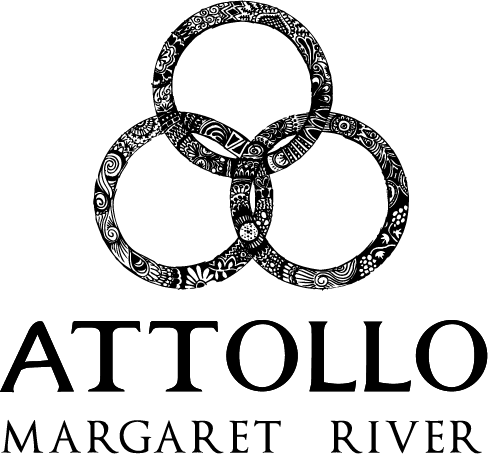CAB SAV 2010
Attollo Organic Cabernet is made from select parcels of organic fruit available in the Margaret River region. The fruit is hand tended throughout the growing season following solely organic practices. The wine is made utilising a “hands-off” approach, with a focus on limited additions and gravity flow operations. The vinification utilises New and Old World influences in creation of a wine with structure and depth that will provide ageability for the medium to long-term, depending on your cellaring conditions.
2010 was a warm to hot year in Margaret River, with a warm start and consistent warm conditions throughout the growing season with limited rain events until the last week of April. Several hot spells from December to January resulted in some sunburn and early raisening for exposed vineyards, requiring attention at harvest to hand select only the best bunches. 2010 ultimately yielded wines with richness, depth and length with strong rustic tannins. The heat spikes associated with the season has given the wines a broad spectrum of flavours to yield complex wines with a broad spectrum of fruit flavours.
The Cabernet for this wine was sourced from two Margaret River vineyards.
2010 Karridale Subregion Cabernet Sauvignon grown using a VSP trellis on gravel loams over clay. The warm vintage resulted in a wine with distinctive black fruit compote, dried herbs and tar, with moderate weight and fine dry talcy tannins.
2011 Caves Road Walcliffe Subregion Cabernet Franc grown using a VSP trellis on gravel loams over clay. The resultant wine had lifted cassis red berry and earthy fruit, with a heavy weight, long length and dry blocky tannins to finish.
Approximatly 10% 2011 Cabernet Franc was added to this wine at blending to add some cassis fruit, sweetness and richness to the midpalate, and length to the finish.
1.1t Organic Karridale Cabernet Sauvignon was hand harvested in April 2010, and destemmed to a combination of 225L barrique fermenters for a two day cold soak. The wine was allowed to ferment naturally, taking three to five days to initiate. Each individual ferment was plunged by hand gently during ferment lasting for 8 to 12 days and peaking at 25 to 28oC. Towards the end of fermentation the barrel fermenters were set on racks and left on skins for a period of 4 weeks [extended maceration] to build palate weight and provide a tannic backbone affording longevity to the wine. The barrels were then gently basket pressed directly back to barrel for malolactic fermentation. Three individual 225L barriques plus one 50L keg resulted from this vinification process. The wines were sulphured at the end of malolactic fermentation and racked by gravity off heavy lees after the lees has compacted. The wines were racked by gravity again 4 months later and matured in oak for a total of 16 months. In August 2011, the individual barrels were then carefully blended by gravity transfer to a stainless steel tank and then transferred to stainless steel drums to clarify and stabilise. The wine was then bottled in January 2012 under screw cap without fining or filtration.
It must be noted- as the wine is Organic Certified – annual audits were required at some cost- which adds to the price tag of this wine- however this guarantees it’s organic status.
pH
Titrateable Acidity [TA] g/L
Residual Sugar [RS] g/L
Volatile Acidity [VA] g/l
Alcohol %
Cases Bottled January 2012
L
6 pack screw cap
Cellaring Best
Best, Maximum
Taste []
Food
